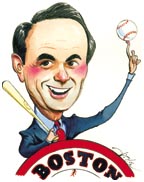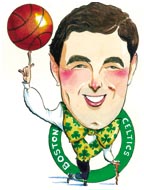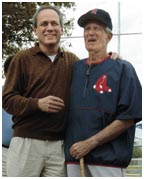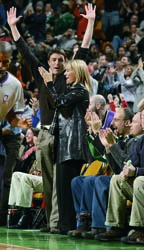April 7, 2004: Features

  |
Homers
and hoops
In sports-crazed Boston, Tigers are major players
By Mark F. Bernstein ’83
Perhaps no city is more passionate about its sports than Boston. Though the Patriots are Super Bowl champions, the city’s sporting life still centers on its baseball and basketball teams – both now owned by Princetonians. Running through the Red Sox’s red and the Celtics’ green is a broad streak of orange and black.
Larry Lucchino ’67
In this era of New York Yankee dominance, many cities consider their baseball teams star-crossed. Few take it to such depths as fans of the Boston Red Sox, who are known to claim that their franchise is cursed – and indeed it has been 85 years since the Sox won the World Series. Few people are better suited to buck that karma than Larry Lucchino ’67, the team’s minority owner, president, and C.E.O., who brings to the task a lawyer’s precision, an athlete’s passion, and a salesman’s zeal.
Larry Lucchino ’67, left, and former Red Sox shortstop Johnny Pesky at the dedication of Johnny Pesky Field March 3. (Julie Cordeiro/Boston Red Sox) |
It seemed unlikely that Lucchino, the son of a working-class family from Pittsburgh, would have ended up at Princeton. He was encouraged to apply by a high school guidance counselor and the local alumni group, which sent him to visit the campus on what was his first airplane trip. Basketball, not baseball, dominated his college years. A point guard on several excellent Princeton teams, including the 1965 Final Four squad, Lucchino spent most of his time on the bench behind classmate Gary Walters ’67, now Princeton’s athletics director.
“What I really admired is that Larry competed hard in practice every day despite limited playing time,” Walters recalls. “He never let it affect how he practiced.” That lack of playing time taught its own lessons; Lucchino says he learned much from Coach Butch van Breda Kolff ’45 about “the importance of making sure everyone on the team knew their role and felt a sense of connection to the enterprise.”
Following graduation, Lucchino went to Yale Law School, where he was a classmate of Hillary Rodham Clinton. It was law, oddly, that led Lucchino to baseball, when he joined the firm of trial lawyer Edward Bennett Williams. Williams owned the Washington Redskins football team and eventually made Lucchino the Redskins’ general counsel. When Williams bought the Baltimore Orioles in 1979, Lucchino drafted many of the papers and became that team’s general counsel, too. And when Williams died in 1988, Lucchino joined the group that bought the Orioles, becoming the team’s C.E.O. and president.
Lucchino brought to baseball many of the qualities of a successful lawyer. He helped navigate the Orioles through the delicate negotiations that led to the construction of Camden Yards, considered by many to be the most beautiful of the new parks. Later, when he moved on to run the San Diego Padres, he won funding for Petco Field. In both cases, framing the argument correctly was important. Lucchino would fine employees $5 for calling the new field a “stadium” rather than a “ballpark.” “The ‘S word,’” we called it,” he says, laughing. “There is something intimate and traditional and irregular about ballparks, and that doesn’t exist when you talk about stadiums, with their concrete regularity and all that.” The nomenclature served a political and marketing purpose, distinguishing the new structures from the unpopular multipurpose stadiums they were designed to replace. While with the Padres, Lucchino instituted a team motto: Todos somos vendedores. We are all salesmen.
“One element of Larry’s philosophy is that he believes in getting input on an issue from different points of view,” says baseball historian Bill James, who is now an adviser to the Red Sox. “Camden Yards illustrates beautifully why this often works. Camden Yards . . . is a result, among other things, of constantly asking, ‘Why can’t we do this, if it is better? What’s stopping us from doing it better?’”
After a falling-out with the other Padres’ owners in 2001, which led to his selling his interest in the team, Lucchino worked briefly for Baseball Commissioner Bud Selig. He was attending a Yale football game that fall when Florida Marlins’ owner John Henry called and asked about the sale of the Red Sox. When Lucchino said that he and the other members of his potential ownership group were looking for another investor, Henry asked to join. The sale was approved in February 2002, and Lucchino took on his other front-office duties.
One mystery of sports is why some teams are perenially good while others are perenially bad. Lucchino places responsibility squarely on himself and his fellow owners. “There’s an old Yiddish proverb: The fish stinks from the head,” he explains. “I think that applies to businesses in general and sports franchises in particular. A lot of it comes from the quality of the ownership and leadership.”
In Boston, Lucchino has encouraged a more statistically based system of player evaluation to complement the observational work done by scouts and coaches. He oversaw the hiring of Bill James as a team adviser, and 28-year-old Theo Epstein, a James devotee, as general manager. Lucchino calls baseball a “yes” business, in which the owner’s job is to find solutions to problems – something, he acknowledges, that can be a challenge in a team that has not sipped champagne since Woodrow Wilson 1879 was president.
But every lawyer knows that you can’t control everything, Lucchino, perhaps, more than most. In 1985, when he was 40 years old, Lucchino returned from a vacation in France with a persistent cough. He was diagnosed with non-Hodgkin’s lymphoma and received an experimental bone-marrow transplant that destroyed and rebuilt his immune system. Lucchino was at so much risk from infection during this period that he was kept in sterile isolation for 37 days at Boston’s Dana Farber Cancer Institute. On the day he was released, a friend arranged for him to sit in a box atop Fenway Park and watch a baseball game.
Almost five years ago, Lucchino was diagnosed with prostate cancer. Does facing cancer twice give him a different perspective on fate, that subject Red Sox fans grouse about so cavalierly?
“I have a pretty strong sense of fate and fortuity, that you can plan all sorts of things, but good luck plays a major role,” he says. “Life is more like roulette than we like to believe. In my case, there’s been lots of good luck, and I’ve had some bad health luck. But on balance, I’ve been a pretty lucky guy.”
Illness has, if anything, increased his drive. “When you’re sick, what you want to do is get back to normal, whatever that was for you. . . . There would be a tendency, you would think, that you’d shift to a lower gear, spend some time walking the beaches or reading the great works of literature. But for me, normality meant getting back to a fast-paced work life.”
The Sox almost made it to the World Series last season and several moves this past winter have reestablished them as serious contenders. As another April rolls around, Boston fans ask: Is 2004 finally The Year?
“I refuse to believe that, let alone suggest it to someone else,” Lucchino answers curtly. Why?
“Because I’m a superstitious baseball executive.”
![]()
Wyc Grousbeck ’83 and his wife, Corinne, cheer courtside during a Boston Celtics—Detroit Pistons game in January. (©2004 NBEA/Sports Action Photography) |
Wyc Grousbeck ’83
If you owned a professional basketball team, you’d sit in a courtside seat right beneath the basket, too. You’d wear your replica jersey or maybe a stylish black leather jacket with the team’s logo stitched on the back. You’d call the players by their nicknames. Of course you’d hang on every fast break and agonize at every missed shot. You might even have your own weekly call-in show on the local sports radio station just to hear what the fans have to say.
Wycliffe “Wyc” Grousbeck ’83, the head of the ownership group that bought the Boston Celtics in September 2002, does all those things. He is parked in one of those front-row seats at Boston’s Fleet Center on a cold night in late January. The New York Knicks, the Celtics’ bitter rivals, are in town, and the game is sold out. Grousbeck is happy to talk about the thrill of owning the winningest franchise in N.B.A. history, but can it wait? First, there is the pregame video.
“I approved the final cut,” he says, leaning back to watch the overhead Jumbotron as it begins to flash Celtics highlights cued to high-volume snippets of the Rocky theme. The crowd goes nuts. An owner’s job involves more than just signing off on contracts or, in this case, announcing the selection of a new head coach earlier in the week. In addition to the video, Grousbeck has recommended a few song titles he’d like to hear during time-outs tonight. “We’ve got ‘Barracuda’ by Heart, a little Zeppelin,” he says, keeping one eye on the scoreboard. “I’m feeling kind of retro.”
The Celtics are kind of retro, too. Like the New York Yankees, Green Bay Packers, and a few other franchises, they have not changed their uniform design in decades. They still play on their fabled parquet floor, albeit in a new arena. And they are the only N.B.A. team without cheerleaders or a dance troupe. “It’s a Celtics tradition,” Grousbeck explains.
But although they have won 16 N.B.A. titles, more than any other team, it has been almost 18 years since the last banner was hung from the rafters. The men who hung it there –
legends such as Larry Bird, Robert Parrish, and Kevin McHale – retired long ago. On this night, the Celtics are fighting for their playoff lives.
Grousbeck grew up a Celtics fan in Worcester, Massachusetts. A successful venture capitalist, he and his father first tried to buy Boston’s beloved Red Sox before losing out to a group headed by another Princetonian, Larry Lucchino ’67. They then pursued the Celtics, paying $360 million, the most ever for an N.B.A. team.
Winning a 17th championship banner may be his consuming goal now, but as a member of the lightweight crew at Princeton, Grousbeck confesses, the only thing he really cared about was winning the Eastern Sprints. That and playing the drums, which he did briefly at several gigs on Prospect Street in a short-lived group called The Daytonas. He went to law school at the University of Michigan, then moved to Silicon Valley to do venture-capital and intellectual-property work.
Three years later, Grousbeck concluded that life was more interesting on the other side of the table and decided to go into business himself. While on vacation in Hawaii, he discovered that the last date for taking the G.M.A.T.s was the next day. He walked from his hotel to the testing center, paid the walk-in fee, sat for the exam cold, and scored well enough to win admission to Stanford’s business school the following spring.
After Stanford, Grousbeck founded a medical data and research firm before becoming a venture capitalist with Highland Capital Partners, specializing in medical startups. That was a booming field in the 1990s, enough so that Grousbeck and his investment group could begin to consider buying a sports franchise. After months of secret negotiations, their bid to buy the Celtics was approved in September 2002, when he was 41, making him the youngest owner in the league.
As a novice owner, Grousbeck cheerfully conceded at his inaugural press conference, “We’ll screw it up daily.” The goal, he said, was to learn and improve. Within two seasons, the Celtics expanded their scouting staff, paying particular attention to Europe, now a fertile source of N.B.A. players.
Grousbeck clearly enjoys the kid-in-a-candy-store aspects of owning a professional sports team, though he says he avoids overdoing it. He stays out of the locker room before games. “I think the role of an owner is to support the team, but you shouldn’t confuse yourself with a fan. You’re also a businessman.” Nevertheless, Grousbeck attends almost every Celtics home game and frequently accompanies the team on the road.
One of four managing partners, Grousbeck is the ownership group’s public face and sits on the N.B.A.’s Board of Governors, though he expects to take less of a public role as he settles in further. He meets regularly with the team’s general manager, Danny Ainge, and seems to have forgiven Ainge for leading the Brigham Young team that knocked Princeton out of the 1981 N.C.A.A. basketball tournament.
Gordon Gund, owner of the Cleveland Cavaliers, says he admires the approach the Celtics’ new owners have taken. “A lot of people fall into the trap of trying to throw a Hail Mary pass, bringing in superstars who have seen better days. They’re [Celtics’ management] trying to build the team from the bottom up.”
Warren Thaler ’84, a minority owner of the Cavaliers who rowed with Grousbeck at Princeton, adds that there is also a personal rivalry among N.B.A. owners that the public does not see. “It’s very competitive – just like crew. . . . All these people have had success in business and know what it’s like to win.”
On this January night, that drive doesn’t help. Although the Celtics play well in the first half, the Knicks pull ahead and win by 18 points. Grousbeck, who has been ranging around the Fleet Center at halftime shaking hands, now watches glumly, his elbows on his knees, running his hands through his hair when Celtics forward Paul Pierce clanks a dunk off the back of the rim. By season’s end, though, the Celtics were clinging to one of the last playoff spots in the Eastern Conference.
Grousbeck is banking that his enthusiasm will help buy the time he needs to make changes. On Grousbeck’s office desk sits a bobble-head doll of Mark Cuban, the mercurial owner of the Dallas Mavericks and the ultimate owner-fan, one known for screaming at referees and chest-bumping his players after games. Will Celtics fans be treated to a Wyc Grousbeck bobble-head someday?
“My head bobbles enough when we lose,” he answers. “They
don’t need to make a doll out of it.” ![]()
Mark F. Bernstein ’83 is senior writer at PAW.


